African Stories on the move in Tunisia!
In recent months we’ve kept track of the African Stories training workshops that have been conducted around the continent with partner African TV broadcasters. And recently the first television co-production feature with DW-TV has been broadcast on the Global 3000 programme.
A team from the Tunisian broadcaster Télévision Tunisienne took on a very hot topic: rappers and their role during the revolution in Tunisia.
Check out it and let us know what you think!
Produced by:
Taha Jemai (Reporter)
Amine Ben Ahmed (Camera)
Ali Addala (Video Editor)
East4South: Subjective Ugandan Dictionary
The East4South programme brings together young journalists from Eastern Europe with experienced journalists from Africa to produce stories together. Now in its third cycle, 10 Eastern European journalists are about to travel to Africa in the next few months to work with their African counterparts.
Balazs Simonyi is a freelance Hungarian photojournalist and filmmaker. Through the East4South programme he travelled to the Gulu district in northern Uganda and to Mayuge in the south-east where he worked with Joshua Kyalimpa on two video stories. One was about rehabilitation of former child soldiers, the other examined fishing and how fish caught in Victoria Lake end up on European dinner tables.
Author: Guy Degen
“C’est un travail de groupe”
Ecoutez ci-dessous Bineta, Aminata et Khady!
Interview Sénégal by dwakademie
Film à voir prochainement sur notre blog!
Latest African Stories workshop in Ghana
Check out the latest videos from African Stories in Accra:
It’s a dirty but lucrative business. Solomon Tetteh works in the waste processing sector in Accra. He holds a university degree, but Solomon was not able to find a job. At first, his friends were not really supportive when he dreamed about building up his own business. Now, a year later, he is not only self-employed, he has also managed to create jobs for several garbage men, giving them the opportunity to support their families. Solomon also promotes environmental awareness in Ghana by distributing free garbage cans in schools. He wants young people to learn early how to separate garbage, and leave the land clean.
Social inequality, a sense of hopelessness in the face of poverty as well as crime drives more and more young people in Africa to use illegal drugs. Richard Armah was one of them. After years of drug abuse, he found the strength to free himself from addiction. Now, as a social worker, he is committed to help addicts from the poorest areas of Accra to say “no” to drugs. He’s been successful, even though his financial means are insignificant. Richard’s approach is preventive: educate people, so they don’t succumb to the temptation of drugs in the first place.
Asidu Abudu is an inspired inventor. A man who wants to make change for the better. Asidu wants to make life easier for his countrymen by creating small and effective devices for everyday use. He believes he has a competitive advantage over foreign inventors because he is more familiar with the needs of the country and its people. His main obstacle is funding. It is difficult to get, and there is not much of it. But this doesn’t stop him from pursuing his dream of going into mass production. In the meantime, he has managed to find some investors, and more and more young people who want to learn from him.
Cassava could help defeat hunger in Africa. Dr. Tay Nanam Dziedzoave is convinced that a great variety of products can be developed from a new high-quality type of cassava. Dr. Dziedzoave joined forces with several local NGOs to convince farmers to grow this new variety. He also helps them to sell the product and increase their income. And Dr. Dziedzoave is also working hard to convince the Government of Ghana that his ideas are worthwhile.
Reporting climate change in Vietnam and in Germany
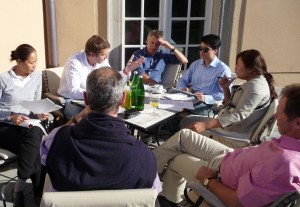 How can the media cover climate change? How do Vietnamese journalists report the topic in their country’s media and how do German journalists cover it for German audiences?
How can the media cover climate change? How do Vietnamese journalists report the topic in their country’s media and how do German journalists cover it for German audiences?
These were the key questions for the first German-Vietnamese Media Dialogue in late September 2011. Journalists from different media in both countries got together to discuss the issue in Germany. The German Federal Foreign Office had invited them to the four-day event, providing a forum for discussion, presentations and excursions. DW-AKADEMIE and GIZ-AgenZ planned and organized the event.
There are key differences in how journalists in both countries can cover environmental issues and the effects and causes of climate change. Vietnam is one of the countries worst affected by the impacts of climate change: It has a coastline of more than 3,000 kilometers and is experiencing an increase in typhoon activity, heavy rains and dry spells.
![]() read more
read more
Digitizing archives in Asia
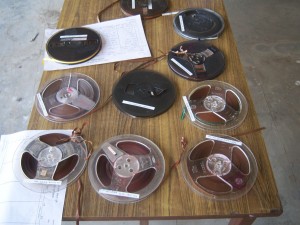 Real treasures can be found in the archives of the state broadcasters Radio the Voice of Vietnam, Radio Nepal and the Sri Lanka Broadcasting Corporation: original audio recordings from the 1930s, historic speeches, old musical recordings. All of that would be lost without painstaking restoration and archiving work.
Real treasures can be found in the archives of the state broadcasters Radio the Voice of Vietnam, Radio Nepal and the Sri Lanka Broadcasting Corporation: original audio recordings from the 1930s, historic speeches, old musical recordings. All of that would be lost without painstaking restoration and archiving work.
The three Asian broadcasters have been professionalizing their methods of archiving and digitizing audio tape as part of a long-term DW-AKADEMIE project. At this year’s International Association of Sound and Audiovisual Archives annual conference held in September 2011 in Frankfurt, Germany, three head archivists showed how their countries were preserving their cultural heritage with archive management and highly modern techniques.
![]() read more
read more
Histoires africaines à Cotonou
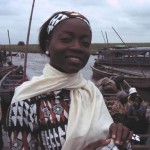
Sans zémijan - Lurhielle, journaliste au Bénin
![]() read more
read more
Painting a different picture of Africa
Being part of the African Stories workshop in Cape Town, I was most excited about meeting fellow young journalists from all over Southern Africa. The first thing I noticed was that we have a lot in common. They, as journalists, want their voices to be heard and they are eager to tell their own stories. But even more so, they want to show the world who they are as Africans – and not leave that to media outlets outside of Africa, which in their view, often present a one-sided image of the continent.
“Western journalists often only concentrate on one area like poverty,” said Mathews Nthala, editor at MUVI TV in Zambia. “In this workshop, we are given the opportunity to show that there is a lot of potential in Africa. Many people are doing well in terms of entrepreneurship and self-empowerment. An African led empowerment, that to me sums up what African Stories is about.”
![]() read more
read more
Producing “Radio for the People” in Vietnam
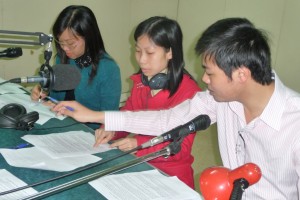 Radio listeners in Northern Vietnam’s Quang Ninh Province probably didn’t know what hit them earlier this year. Instead of drab propaganda programs, the radio was playing popular music interspersed with traffic information and listeners’ calls. And this new show was presented by a friendly host who was talking to the listeners at eye level. So far, radio hosts had sounded more like talking machines who thought it necessary to instruct the audience what to think.
Radio listeners in Northern Vietnam’s Quang Ninh Province probably didn’t know what hit them earlier this year. Instead of drab propaganda programs, the radio was playing popular music interspersed with traffic information and listeners’ calls. And this new show was presented by a friendly host who was talking to the listeners at eye level. So far, radio hosts had sounded more like talking machines who thought it necessary to instruct the audience what to think.
The program the listeners of QTV radio in Quang Ninh Province were hearing was “Rush Hour”, a one-hour morning show that the station had just started with the help of DW-AKADEMIE, Friedrich-Ebert Foundation and Vietnam’s Academy of Journalism and Communication.
![]() read more
read more
La lutte sénégalaise et les pêcheurs traditionnels – Histoires Africaines à Dakar
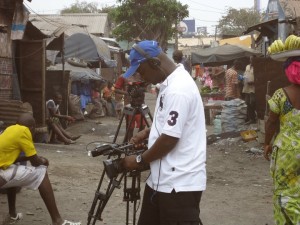 Que peut-on faire de beau à partir de déchets plastiques ? Quel est le sport-roi du Sénégal ? Comment vivent les pêcheurs sénégalais ? Si vous voulez des réponses à toutes ces questions, regardez les films que les participants de l’atelier “Histoires africaines – Reportages TV” (African Stories – read more in English) ont réalisé à Dakar.
Que peut-on faire de beau à partir de déchets plastiques ? Quel est le sport-roi du Sénégal ? Comment vivent les pêcheurs sénégalais ? Si vous voulez des réponses à toutes ces questions, regardez les films que les participants de l’atelier “Histoires africaines – Reportages TV” (African Stories – read more in English) ont réalisé à Dakar.
Neuf participants venant de la Guinée Conakry et du Sénégal ont travaillé dur pendant deux semaines au mois de juillet. Ils ont supporté la chaleur, la pluie mais aussi les méthodes allemandes de travail, notamment pour ce qui concerne le visionnement minutieux des rushs.
L’atelier a eu lieu au sein du CESTI (Centre d’Études des Sciences et Techniques de l’Information) à Dakar au Sénégal. Cela a représenté deux semaines intensives d’échange, de défis mais aussi de plaisir.
![]() read more
read more




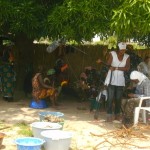
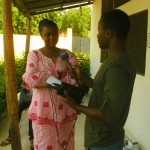
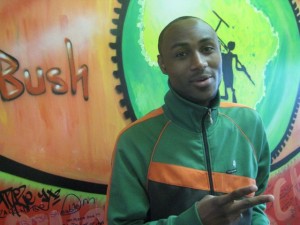




Feedback